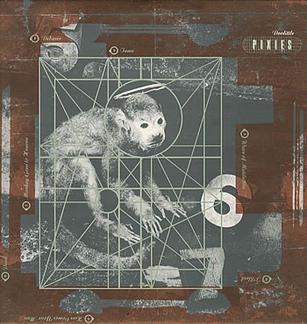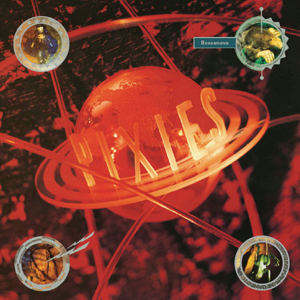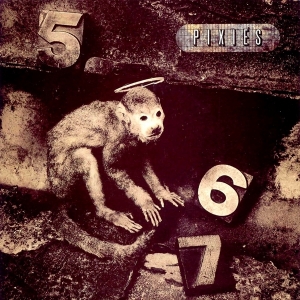Related Research Articles

The Pixies are an American alternative rock band from Boston, Massachusetts formed in 1986 by Black Francis, Joey Santiago, Kim Deal and David Lovering (drums).

Charles Michael Kittridge Thompson IV is an American singer, guitarist, and songwriter. He is the frontman of the alternative rock band Pixies, with whom he performs under the stage name Black Francis. Following the band's breakup in 1993, he embarked on a solo career under the name Frank Black. After releasing two albums with record label 4AD and one with American Recordings, he left the label and formed a new band, Frank Black and the Catholics. He re-adopted the name Black Francis in 2007.

Kimberley Ann Deal is an American musician. She was the original bassist and co-vocalist in the alternative rock band Pixies from 1986 to 1993 and 2004 to 2013, and is the frontwoman of the Breeders, which she formed in 1989.

Doolittle, the second studio album by the American alternative rock band Pixies, was released on April 17, 1989, on 4AD records. The album was an instant critical success and became the band's breakthrough album. Doolittle was especially well received in Europe, where the British music weeklies Melody Maker and Sounds named it their album of the year. Pixies' main songwriter and lead vocalist Black Francis wrote the idiosyncratic lyrics, which allude to surrealist imagery, biblical violence, and descriptions of torture and death.

Surfer Rosa is the debut studio album by the American alternative rock band Pixies, released in March 1988 on the British label 4AD. It was produced by Steve Albini. Surfer Rosa contains many of the elements of Pixies' earlier output, including Spanish lyrics and references to Puerto Rico. It includes references to mutilation and voyeurism alongside experimental recording techniques and a distinctive drum sound.

Bossanova is the third studio album by American alternative rock band Pixies. It was released on August 13, 1990, by English independent record label 4AD in the United Kingdom and by Elektra Records in the United States. Because of 4AD's independent status, major label Elektra handled distribution in the USA.

Come On Pilgrim is the debut mini-album by the American alternative rock band Pixies, released on September 28, 1987, on 4AD. Produced by Gary Smith, the release consists of eight tracks from a seventeen-song recording session that the band had recorded at Fort Apache Studios in March 1987.

Joseph Alberto Santiago is a Filipino-American guitarist and composer. Active since 1986, Santiago is best known as the co-founder and lead guitarist of the alternative rock band Pixies. After the band's breakup in 1993, Santiago produced musical scores for film and television documentaries, and he formed The Martinis with his ex-wife, Linda Mallari. He also contributed to albums by Charles Douglas and former Pixies band-mate Frank Black. Santiago resumed his role as the Pixies' lead guitarist when they reunited in 2004.

David Sullivan Lovering is an American musician and magician. He is best known as the drummer for the alternative rock band Pixies, which he joined in 1986. After the band's breakup in 1993, Lovering drummed with several other acts, including The Martinis, Cracker, Nitzer Ebb and Tanya Donelly. He also pursued a magic career as the Scientific Phenomenalist, performing scientific and physics-based experiments on stage. When the Pixies reunited in 2004, Lovering returned as the band's drummer.

Pixies is an EP by the American alternative rock band of the same name, released in 2002 by SpinART Records in the U.S., Cooking Vinyl in the UK and Sonic Unyon in Canada. It consists of the remaining songs from the band's original 17-track demo tape, eight songs of which were released in 1987 as the band's debut, Come On Pilgrim. All 17 songs were recorded by Gary Smith at Fort Apache Studios in March 1987.

Death to the Pixies is a compilation album by the American alternative rock band Pixies, released by 4AD in the UK on October 6, 1997, and 4AD/Elektra the following day in the United States to commemorate the 10th anniversary of the band's debut. It covered the years 1987 to 1991. It is now out of print, having been replaced by the 2004 compilation Wave of Mutilation: Best of Pixies. A limited edition of the compilation also included a second CD with a live performance taken from Vredenburg, Utrecht, Netherlands on September 25, 1990.

Pixies at the BBC is a compilation of BBC radio sessions by the American alternative rock band Pixies. Released by 4AD on July 6, 1998, in the United Kingdom and by Elektra Records on July 14, 1998, in the United States—five years after the band's initial split—it was recorded over several sessions between 1988 and 1991 at the BBC. The album is characterized by its raw, under-produced sound.

Complete 'B' Sides is a compilation album of songs by American alternative rock band Pixies. It features the B-sides for seven out of eight of their UK singles, as well as for one USA single, from the 1980s and 1990s. The eighth, "Letter to Memphis", had no B-sides. These singles are:
- "Gigantic" (1988)
- "Monkey Gone to Heaven" (1989)
- "Here Comes Your Man" (1989)
- "Velouria" (1990)
- "Dig for Fire" (1990)
- "Planet of Sound" (1991)
- "Alec Eiffel" (USA) (1991)

"Here Comes Your Man" is a song by the American alternative rock band Pixies, written and sung by the band's frontman Black Francis. Produced by Gil Norton, it was released as the second single from the group's second album Doolittle in June 1989.

"Gigantic" is a song by the American alternative rock band Pixies, co-written by bassist Kim Deal and lead vocalist/guitarist Black Francis. The song appeared on the band's first full-length studio album, Surfer Rosa, released in 1988. One of the longest songs on the album, "Gigantic" was released as the band's first single later that year.

"Debaser" is a song by American alternative rock band Pixies, released in April 1989 as the opening track on their album Doolittle and later as a promotional single following the dissolution of the band.

"Monkey Gone to Heaven" is a song by the American alternative rock band Pixies. Recorded in November 1988 during the sessions for the band's 1989 album Doolittle, it was released as a single in March, and included as the seventh track on the album when it was released a month later in April. The song was written and sung by frontman Black Francis and was produced by Gil Norton. Referencing environmentalism and biblical numerology, the song's lyrics mirrored themes that were explored in Doolittle. "Monkey Gone to Heaven" was the first Pixies song to feature guest musicians: two cellists, Arthur Fiacco and Ann Rorich, and two violinists, Karen Karlsrud and Corine Metter.

"Velouria" is a song by the American alternative rock band Pixies, written and sung by the band's frontman Black Francis. The song was written as a love song rooted in Francis's experience with a girl associated with the Rosicrucians of Northern California. The lyrics also touched on Francis's interest in UFOs. Musically, the song features surf rock elements as well as a prominent theremin part.

The discography of Pixies, an American alternative rock band, includes nine studio albums, 26 singles, seven compilations, one mini-LP, and five EPs as of September 2024.
"Where Is My Mind?" is a song by American alternative rock band Pixies, originally released as the seventh track on their 1988 debut album, Surfer Rosa.
References
- 1 2 3 Sisario, Ben (8 March 2006). The Pixies' Doolittle. Bloomsbury Publishing USA. ISBN 978-1-4411-2141-7.
- ↑ Kivel, Adam; Schonfeld, Zach (17 April 2019). "10 Stories Behind the Pixies' Doolittle" . Retrieved 23 March 2024.
- ↑ "Talking with the Animals" (PDF). NME: 45. 22 April 1989.
- ↑ Mendelssohn, John (15 December 2009). Gigantic: The Story Of Frank Black And The Pixies. Omnibus Press. ISBN 978-0-85712-116-5.
- ↑ "Pixies: Complete B-Sides". Pitchfork. Retrieved 23 March 2024.
- ↑ "Pixies - Doolittle 25". Uncut. 21 January 2015. Retrieved 23 March 2024.
- ↑ Maginnis, Tom. "Wave of Mutilation by Pixies". AllMusic. Retrieved 23 March 2024.
- ↑ Sisario, Ben (30 September 2017). "Pixies' "Doolittle" and the long shadow of the White Album". Salon. Retrieved 23 March 2024.
- ↑ "Your Favorite Pixies Songs". NME. 26 May 2004. Retrieved 23 March 2024.
- ↑ "Readers' Poll: The 10 Best Pixies Songs". Rolling Stone. 9 October 2013. Retrieved 23 March 2024.
- ↑ Kim, Dave (23 July 2012). "10 Best Pixies Songs". Diffuser.fm. Retrieved 23 March 2024.
- ↑ "Pixies' 20 greatest guitar moments, ranked". Guitar. Retrieved 23 March 2024.
- ↑ Bosso, Joe (18 July 2011). "Interview: Pixies' David Lovering talks Doolittle track-by-track". MusicRadar. Retrieved 23 March 2024.
- ↑ "Canadian single certifications – Pixies – Wave of Mutilation". Music Canada . Retrieved July 1, 2024.